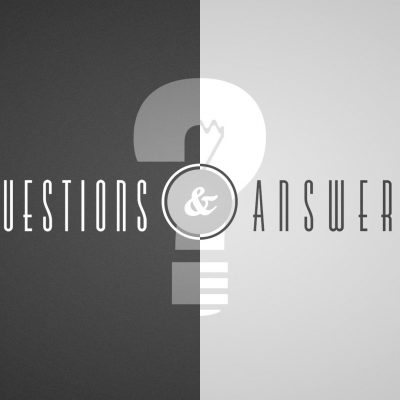SERMON SUMMARY
For the last three weeks our worldview questions have dealt with some of the basic foundations of knowledge. We’ve talked about the trustworthiness of the Bible and about how science and faith relate to each other. Today we’ll seek to gain a biblical answer to the question: What are people? King David was curious about this as well—see Psalm 8. David acknowledges the power and majesty of God, and when he asks “What is man,” his question is not simply, “What are human beings?” but “Who are we in relation to you, God?” This is an important place to start our discussion. When we consider the value, the purpose, and the dignity of human beings, we are starting on the wrong foot if we don’t consult their designer. If we ask science, culture, or history what we are, we end up with some incomplete and at times dangerous answers. If we are to view ourselves solely as biological beings, we get an incomplete picture of humanity. If we deny the existence of the soul we deny the existence of good and evil, right and wrong. A survey of human history views man as being property and currency. Man has been expendable and valuable only for what he can produce for society. So that brings us back to Psalm 8. Not just, “What is man?” but, “God, who did you design us to be?”
Genesis 1:26-27 reveals that we were made in God’s image. There’s a growing fascination with comparing human behavior to animal behavior in order to learn about man. But God says we’ve got that all wrong. To learn about man, we shouldn’t be looking downwards at animals but upwards to God! We are the pinnacle of God’s creation; we bear his signature. We can’t truly honor the Creator if we dishonor the pinnacle of His creation (James 3:9). A biblical worldview on the subject of man must result in giving man the same dignity and value that God does. We were bought with a price: the perfect blood of Jesus (1 Corinthians 6). Man’s value isn’t to be determined by race or by his usefulness (Galatians 3:28).
Euthanasia has become a celebrated medical option for the terminally ill. “Passive” euthanasia, when a terminally ill person decides to cease medical interventions that are prolonging their life, is sad, but biblically permissible. It’s not causing death, it’s allowing the natural causes of death to take effect. The dark side of euthanasia, “active” euthanasia, is when we actively cause death for the patient. I know that the pain and suffering that can go along with terminal diseases is immense both physically and emotionally for the whole family. But this doesn’t give us permission to purposefully end a life. Active euthanasia assumes that God cannot heal. How certain must we be that a disease is terminal to allow a doctor to end someone’s life? Is all suffering senseless and without value? Accepting active euthanasia puts us on a slippery slope from giving patients the right to die to believing that patients have a duty to die. It’s easy to connect the dots to the argument that if a patient has lost enough functionality and is draining money and resources from the hospital and their family, the ethical thing to do is to die. And euthanasia no longer is just for the elderly—recently in Belgium two children were euthanized!
To learn more about this topic, read Pastor Doug’s sermon transcript: Critical Issues Facing the Church: Euthanasia.
To learn more about this topic, read Pastor Doug’s sermon transcript
There is one other implication we cannot ignore: abortion. There are close to 900,000 abortions in the United States each year. Abortion is the leading cause of death in America. Jeremiah 1:5 and Psalm 139:13-16 reveal that God has been mindful of us even before we existed in the womb! Less than 1.5% of abortions have anything to do with health issues for the mother or child, or with rape. That means that over 850,000 babies were aborted because they were an inconvenience! Church, we can’t stand silent on the issue of abortion. Abortion is the most widespread social justice issue we can be involved in. And if we are to be voices advocating for the unborn, we also need to be the leading hands and feet providing other options for the unborn. Prayerfully consider if adoption is a possibility for your family. There’s no doubt it’s a long, difficult road, but it’s a necessary road to travel down if we are to effectively advocate for the unborn. We can make a difference. Some of us can bring a child into our homes. Others can help financially. We can be surrogate grandmas and grandpas or aunts and uncles. What you can’t do is denounce the crisis that is abortion and do nothing to help.
To learn more about this topic, read Pastor Doug’s sermon transcript: Critical Issues Facing the Church: Abortion.
APPLICATION / CHALLENGE
- Advocate for the unborn! This is TCC’s week to partner with Love Life and Hand of Hope. This Wednesday many of us will fast and pray. Saturday (9-11am) join your church family at Hand of Hope Pregnancy Resource Center (1522 Jones Franklin Road) for a peaceful prayer vigil.
- Traumatized by abortion? Don’t suffer in silence: contact us for free biblical counseling at: counseling@tcc.org
- Learn more about adoption! At this moment 2,000 children in North Carolina’s foster care system are cleared for adoption. How should you be involved? Here are two resources:
TAKE ONE STEP
Each week, write down one doable concrete step of obedience, small or large that you will put into practice this week. (James 1:22: “But prove yourselves doers of the word, and not merely hearers who delude themselves.”)


